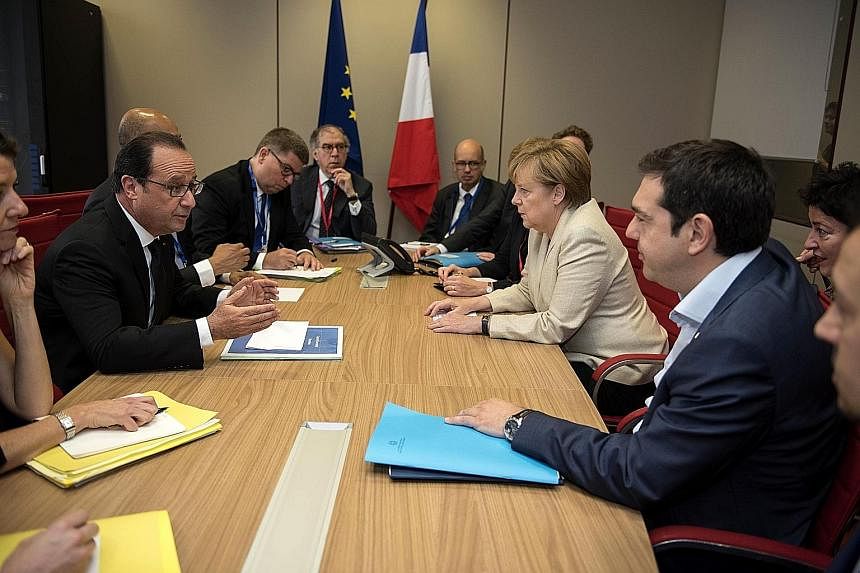BRUSSELS - The leaders of Germany and France yesterday offered to release billions in frozen aid in a last-minute push to talk Greek Premier Alexis Tsipras into contentious pension reforms in exchange for filling Athens' empty coffers until November.
The leftist Premier's response, according to a Greek official, was that he could not understand why his country's creditors were seeking to impose such harsh conditions in return for money to avert imminent default and damage to the euro zone.
German Chancellor Angela Merkel and French President Francois Hollande, whose countries are Athens' two biggest lenders, held a 45-minute private meeting with Mr Tsipras before the final session of a European Union summit at which they went through details of immediate funding for Greece if it would sign the deal.
The creditors laid out terms in a document that went to Greece on Thursday. According to the document, Greece could have €15.5 billion (S$23.3 billion) in EU and International Monetary Fund funding (IMF) in four instalments to see it through to the end of November, including €1.8 billion by Tuesday, as soon as the Greek Parliament approved the plan.
The total is slightly more than Greece needs to service its debts over the next six months but contains no new money. A French source said Dr Merkel and Mr Hollande discussed outstanding differences on reforms Greece needs to accept - centred on pension reform, labour law and increasing value-added tax - as well as an extension to Athens' bailout programme and financing.
The two leaders said that today's emergency meeting of euro-zone finance ministers would be decisive to seal a deal before Greece has to make a key IMF repayment for which the government has said it lacks the money.
"Saturday's meeting is crucial because we are on the eve of a date, June 30, when the Greek authorities have to meet a payment obligation," Mr Hollande told a news conference. "It's also crucial because there are parliaments that have to meet if there's a deal."
At the meeting, Greece will be asked whether it accepts a revised offer from the European Commission, the European Central Bank and the IMF, a euro-zone official said.
If Greece refuses, the ministers will move on to discussing a "Plan B" on preparing to limit the damage from a Greek default to Greek banks and other euro-zone countries and markets, the official added.
However, Dr Merkel and Mr Hollande have refused to talk publicly about "Plan B", saying their efforts are focused on getting an agreement to keep Greece in the euro zone.
In public, Berlin kept up the pressure on Athens to yield, saying it was up to the Greek government to move.
Officials said that talks to reconcile the creditors' and Greek positions were continuing behind the scenes, even though Athens continues to denounce the lenders' proposals.
Greek Finance Minister Yanis Varoufakis again blasted the creditors' approach in an interview with Irish radio yesterday, saying their demands for tax increases and pension cuts as conditions for disbursing aid were putting Greece in an impossible position.
"I am against increasing the corporate tax, but then again I am against raising the tax on hotels and against cutting the pensions of people who live below the poverty line," he said. "These issues are putting me and my government in an impossible position, having to make a bad choice among really hard, difficult bad choices." But he did not rule out accepting the terms.
Dramatising the choice facing Athens, Germany's European Commission member Guenter Oettinger said Greece had five days left to avoid a euro-zone exit.
China, a growing economic partner of the EU, yesterday offered a vote of confidence in the euro zone ahead of Premier Li Keqiang's Europe visit next week, saying it was sure Greece's talks with creditors would go positively.
REUTERS

